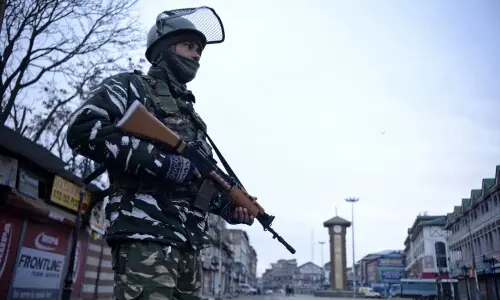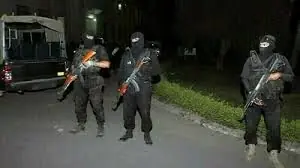DHAKA: Thousands of Bangladeshi garment workers churning out clothes for top global brands walked off the job on Sunday and clashed with police as protests over low wages entered a second week.
Police said water cannons and tear gas were fired to disperse huge crowds of striking factory workers in Savar, a garment hub just outside the capital Dhaka.
“The workers barricaded the highway, we had to drive them away to ease traffic conditions,” industrial police director Sana Shaminur Rahman said about Sunday’s strike action.
More than 50 units have been forced to shut down due to ongoing strikes
“So far 52 factories, including some big ones, have shut down operations due to the protests.”
One worker was killed on Tuesday after police fired rubber bullets and tear gas at some 5,000 protesting workers.
Bangladesh is dependent on garments stitched by millions of low-paid tailors on factory floors across the emerging South Asia economy of 165 million people.
Roughly 80 per cent of its export
earnings come from clothing sales abroad, with global retailers H&M, Primark, Walmart, Tesco and Aldi among the main buyers.
Union leader Aminul Islam blamed factory owners for resorting to violence to control striking workers. “But they are more united than ever,” he said.
“It doesn’t seem like they will leave the streets, until their demands are met.”
The protests are the first major test for Prime Minister Sheikh Hasina since winning a fourth term in December 30 elections marred by violence, thousands of arrests and allegations of rigging and intimidation.
Late on Sunday, the government announced a pay hike for mid-level factory workers after meeting manufacturers and labour unions. Not all unions have signalled they will uphold the agreement.
Babul Akhter, a union leader present at the meeting, said the deal should appease striking workers.
“They should not reject it, and peacefully return to work,” he said.
Minimum wages for the lowest-paid garment workers rose by a little over 50 per cent this month to 8,000 taka ($95) per month.
But mid-tier tailors say the rise was paltry and fails to reflect the rising costs of living, especially in housing.
‘No work, no pay’
Bangladesh’s 4,500 textile and clothing factories shipped more than $30 billion worth of apparel last year.
The Bangladesh Garment Manufacturers and Exporters’ Association, which wields huge political influence, warned all factories might be shut if tailors did not return to work immediately.
“We may follow the ‘no work, no pay’ theory, according to the labour law,” association president Siddikur Rahman told reporters.
Last year Bangladesh was the second-largest global apparel exporter after China. It has ambitious plans to turn the sector into a $50bn-a-year industry by 2023.
But despite their role in transforming the impoverished nation into a major manufacturing hub, garment workers remain some of the lowest paid in the world.
The industry also has a poor workplace safety record.
The Rana Plaza garment factory collapse in 2013 killed more than 1,130 people in one of the world’s worst industrial accidents.
Following the disaster, major retailers formed two groups to introduce factory reforms. The Bangladesh Garment Manufacturers and Exporters’ Association says its members have since invested $1bn in safety upgrades.
Published in Dawn, January 14th, 2019

































